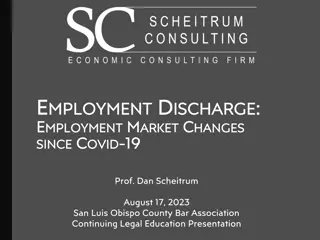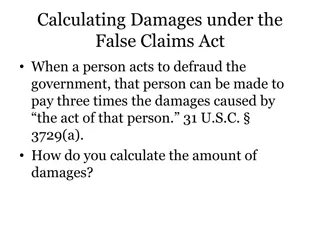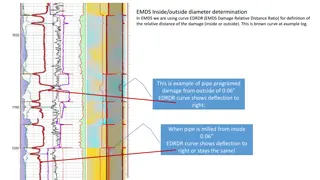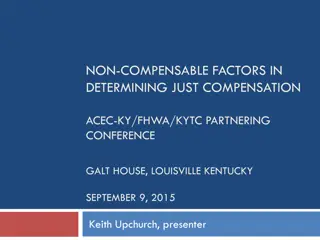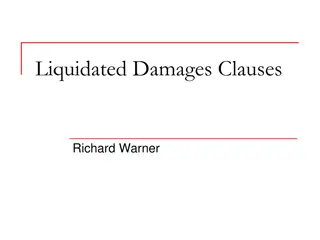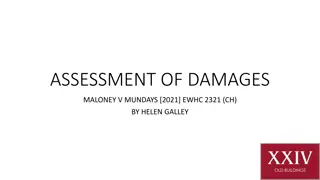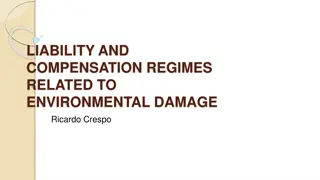Reliance Damages
Explore the concepts of reliance and expectation damages, their definitions, differences, and implications in contract law, illustrated through relevant case examples.
Download Presentation

Please find below an Image/Link to download the presentation.
The content on the website is provided AS IS for your information and personal use only. It may not be sold, licensed, or shared on other websites without obtaining consent from the author.If you encounter any issues during the download, it is possible that the publisher has removed the file from their server.
You are allowed to download the files provided on this website for personal or commercial use, subject to the condition that they are used lawfully. All files are the property of their respective owners.
The content on the website is provided AS IS for your information and personal use only. It may not be sold, licensed, or shared on other websites without obtaining consent from the author.
E N D
Presentation Transcript
Reliance Damages Richard Warner
Expectation /Mitigation Money damages inadequate (perhaps the result of proof problems) Proof problems (but money damages adequate if proven) Specific Performance Reliance Return items equitable? Material breach (or other) requirement Restitution Rescission
Reliance Damages The Restatement defines reliance damages this way: Expenses incurred in reliance on the contract.
Getting Both Can you get both reliance damages and expectation damages for the same breach of contract? (a) Yes (b) No Remember the fundamental goal of awarding damages.
Reliance damages = expenses incurred in reliance on the contract, so it looks like this should be right: Formation Breach Negotiation Reliance expenses
But (most) courts treat reliance damages in a way that makes this the right picture. Formation Breach Negotiation Reliance expenses
Compare expectation damages. Expectation damages Formation Breach Negotiation Reliance expenses
Security Stove v. Am. Ry. Express Security Stove invented a new stove. The innovation was a value that had setting for burning oil and a setting for burning gas. They hired American Railway Express to deliver the new stove to trade show. The stove was packaged in several boxes. All the boxes arrived except one--the one containing the value. Without the valve, displaying the rest of the stove at the show was pointless.
Background Why did Security Stove go to the trade show? To display the stove with the new valve in order to generate future sales. It did not plan sell any stoves at the show.
Promise Kept Position If the valve had been delivered as promised, it would be reasonable to expect that Security Stove (a) Would have sold some stoves later on. (b) Would not have sold some stoves later on.
Losses As A Result of the Breach? The losses are no sales later on from going to the show. (a) Yes (b) No
Award Assume there are no mitigation possibilities. Then, the expectation measure awards the lost profits (putting aside proof issues and assuming foreseeability). (a) Yes (b) No
Reasonable Foreseeability Were the lost profits reasonably foreseeable by Am. Ry. Express at the time of contracting as the probable result of the breach? (a) Yes (b) No
Proof 1 If the court follows the old new business rule, can Security Stove prove its damages with reasonable certainty? (a) Yes (b) No
Proof 2 Put aside the old new business rule, does Security Stove have any prior track record of sales with the new stove that it could use as evidence of what sales from going to the trade show would have been? (a) Yes (b) No
Reliance Damages In Security Stove "Plaintiff asked damages, which the court allowed as follows: $147.00 express charges (on the exhibit); $45.12 freight on the exhibit from Atlantic City to Kansas City; $101.39 railroad and Pullman fare to and from Atlantic City, expended by plaintiff's president and a workman taken by him to Atlantic City; $48.00 hotel room for the two; $150.00 for the time of the president; $40.00 for wages of plaintiff's other employee and $270.00 for rental of the booth, making a total of $801.51."
The Booth Rental Security Stove rented the booth before entering the contract with American Railway Express. So, in what sense is the $270 incurred in reliance on the contract?
The Courts Explanation While, it is true that plaintiff already had incurred some of these expenses, in that it had rented space at the exhibit before entering into the contract with defendant for the shipment of the exhibit and this part of plaintiff's damages, in a sense, arose out of a circumstance which transpired before the contract was even entered into, yet, plaintiff arranged for the exhibit knowing that it could call upon defendant to perform its common law duty to accept and transport the shipment with reasonable dispatch. The whole damage, therefore, was suffered in contemplation of defendant performing its contract, which it failed to do, and would not have been sustained except for the reliance by plaintiff upon defendant to perform it. It can, therefore, be fairly said that the damages or loss suffered by plaintiff grew out of the breach of the contract, for had the shipment arrived on time, plaintiff would have had the benefit of the contract, which was contemplated by all parties, defendant being advised of the purpose of the shipment.
Anglica Television Ltd v. Reed Anglia TV contracted with Robert Reed (the father in The Brady Bunch) to star in the made for TV film, The Man in the Wood. Just before filming began, Reed refused to star in the film Anglica TV asked for reliance damages of 2750. A significant part of that amount has been incurred before Reed entered his contract. Judge Denning held that Anglica TV could recover the whole 2750 because the were such "as would reasonably be in the contemplation of the parties as likely to be wasted if the contract was broken." What is the rationale? Assumption of the risk? Fairness?
Beefy Trail v. Beefy King Essentially, the rationale is this: Normally, had the contract's performance not been prevented by the defendant, and the contract had been a profitable one for the plaintiff, the plaintiff would have recovered over the life of the contract a gain, sufficient not only to fully reimburse him for his expenditures, but also to yield an excess which would be the profit.
Beefy Trail v. Beefy King, Continued Since the amount of the gross receipts (i.e., the gain) cannot be determined with the requisite degree of certainty, the amount of the profit cannot be determined and therefore cannot be allowed in the recovery. But the amount of the gain which would have reimbursed plaintiff for the expenditures incurred in preparation and part performance can be determined by and to the extent of these expenditures, and therefore this amount can be allowed in the recovery.
Albert v. Armstrong Rubber (simplified facts) Armstrong Rubber purchased a rubber reconditioning machine from Albert. During WWII demand for rubber was so great that one could make money by reconditioning old rubber. Albert breached by not delivering the machine. The war ended before the delivery of the machine. Armstrong Rubber would have lost money if the machine had been delivered. Armstrong Rubber s expectation damages are $0. (a) Yes (b) No
Reliance Damages Armstrong Rubber spent $3000 in reliance on the contract laying a cement foundation for the machine. It s reliance damages are (a) $3000 (b) $0
Deducting Losses The court (Judge Learned Hand) held that the seller may deduct from the $3000 any sum which upon a further hearing it can prove would have been the Buyer's loss upon the contract, had the [machine] been delivered on [time].
Tony Tony Tenor signs a contract with a movie company for the part of "Mad Dog" in the movie "Invasion of the Frat Boys", a comedy set in Malibu. In the contract, Tony agrees to gain 50 pounds--since the part calls for him to be fat, and he also agrees to learn to speak without his strong New York accent. Tony hires a nutritionist and a speech therapist, and succeeds in gaining weight and losing his accent. However, the company never makes the movie since the city of Malibu denies it a permit to film in Malibu. The Malibu City Council imposes very stringent requirements for issuing such permits. Films showing Malibu have to be "consistent with the image of Malibu as a dignified and quiet upper class community." The Council held that "Invasion of the Frat Boys" was not consistent with this image. Can Tony recover the payments to the nutritionist and speech therapist under the reliance measure? a) Yes b) No
Pomegranate Computers Pomegranate computers, located in Los Angeles, has developed a breakthrough design in computer monitors, the Hades series. They plan to display it at the Winter Computer Trade Show in Chicago (they do not intend to sell any monitors there). They hire Olympus Express, a transportation company, to deliver the monitor and related equipment to Chicago in time for the show. Olympus delivers everything but the monitor, which somehow slipped through the cracks and disappeared as if swallowed up by the earth. Without the monitor, Pomegranate's attendance at the show is pointless. Pomegranate spent $5000 in preparing to go to the show and display the monitor. They spent $2500 of this money before they made the contract with Olympus. Pomegranate sues Olympus for breach of contract. Pomegrante can recover $5,000 under the reliance measure of damages? A. True B. False
Harry and Sally When Harry met Sally, they signed a contract for Harry to sell 10 hula-hoop making machines to Sally, who plans to manufacture and sell hula-hoops. Prior to delivery but after signing the contract, Sally spends $3000 laying a concrete floor for the machines in her factory. Harry then refuses to sell the machines to Sally. Assume that Sally cannot prove with reasonable certainty what her profits would have been from manufacturing and selling hula-hoops; assume also that the hula-hoop market has entered a downward spiral and that Sally would have actually incurred a net loss of money if the machines had been delivered. (a) If the court follows a strict reliance measure of damages (awarding all and only the money Sally spent in reliance on the contract), it will award her the $3000 she spent laying the foundation. (b) In such cases, the court may award Sally the $3000 she spent in reliance on the contract, but it will allow Harry to deduct from this amount any money he can prove that Sally would have lost had the machines been delivered as promised. (c) (a), (b)




